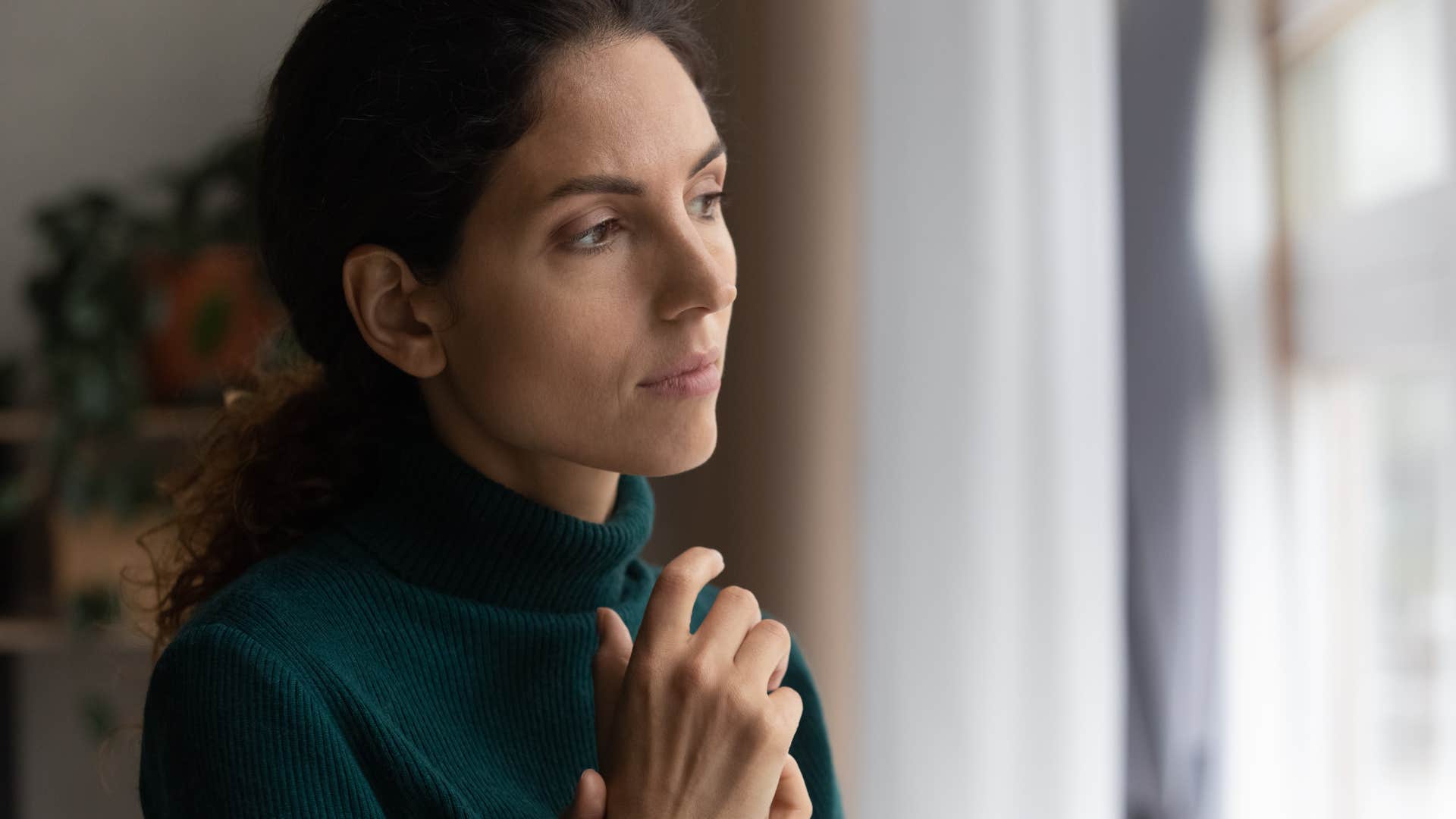11 Things That Happen To Adults Who Felt Like The Black Sheep In Their Family Growing Up
It's difficult to shake the feeling of being an outsider in your own home.
 Jose Calsina | Shutterstock.com
Jose Calsina | Shutterstock.com Being viewed as the black sheep in your family creates an anxious atmosphere for children as they grow up. Because they feel less worthy and unappreciated by their parents, there are specific things that happen to adults who felt like the black sheep in their family growing up.
Clinical psychologist Dr. Ramani Durvasula says that the “black sheep” in families are invalidated, often criticized, and isolated from other people in their lives simply for being who they are. Sometimes, this disconnect is due to a misalignment of values or lifestyles, but more often than not this reputation comes about when parents try manipulating their kids into fitting into a certain mold, leveraging the right to a sense of belonging over their heads.
Here are 11 things that happen to adults who felt like the black sheep in their family growing up
1. They struggle with codependency
 MAYA LAB | Shutterstock.com
MAYA LAB | Shutterstock.com
Many adults who felt like the black sheep in their family weren’t automatically given praise or attention growing up. Instead, they had to seek it out, setting their own emotions and needs aside to fit the mold their parents wanted them to.
In adulthood, this feeling of being an outsider is difficult to unlearn, and the emotional consequences associated with that isolation can manifest in unproductive ways.
Experts from Prospect Therapy say that many of these adults continue to feel a sense of codependency in their relationships later in life, still grasping for the attention they yearned for as a child. Wanting to feel appreciated or treated better, they rely on toxic behaviors and habits to seek validation, love, and support from others who may still perpetuate unhealthy relationship dynamics.
2. They isolate themselves from family
 Perfect Wave | Shutterstock.com
Perfect Wave | Shutterstock.com
While some adults who felt like a black sheep growing up become enmeshed with their families later in life, still seeking positive attention and praise, others completely disconnect or go “no contact” with their families in an attempt to heal from their childhood trauma of being treated like an outcast.
To avoid the negative emotions associated with their childhoods, they may skip family gatherings, stop answering calls from their parents, or try to create as much distance from their families as possible.
While this can be productive for people taking actionable measures towards healing, it can be equally disempowering for others who are still harboring resentment.
3. They struggle with low self-esteem and insecurity
 Fizkes | Shutterstock.com
Fizkes | Shutterstock.com
Children learn how to appreciate, love, and care for themselves from their parents growing up. When they’re treated with respect, given space to feel heard, and empowered to set boundaries, they tend to enter adulthood with a more stable sense of self-worth than those who don’t grow up in a similarly healthy environment.
For adult children treated like an outcast or black sheep by their parents, they may enter into adulthood with a misguided sense of unworthiness — never truly feeling appreciated or empowered by their parents, simply because of who they are.
This negative self-worth and insecurity can sabotage their emotional well-being and future relationships, leading them into toxic behaviors as they feel pressure to prove themselves and seek validation from others.
4. They sabotage healthy connections
 Srdjan Randjelovic | Shutterstock.com
Srdjan Randjelovic | Shutterstock.com
Many children who grew up as an outsider in a home with people that should have been their biggest advocates struggle with consistency and stability in their relationships later in life.
When they’re finally treated with respect, love, and made to feel heard, it’s only inevitable that they’ll revert to feelings of insecurity and anxiety — remembering their parents’ tendency to push them away.
The lack of affection coupled with criticism growing up gives rise to a belief that relationships are transactional, insecure, and unstable. Feeding into their unhealthy coping mechanisms and relationship dynamics, these adult children may even seek out unhealthy relationships that mirror their parents behavior — believing that their own self-esteem issues make it impossible for them to find fulfilling connections.
5. They develop negative coping mechanisms
 La Famiglia | Shutterstock.com
La Famiglia | Shutterstock.com
Many adult children who grew up as the black sheep in their families weren’t taught how to effectively cope with stress, anxiety, or internal turmoil. Their inability to make their needs known, regulate their discomfort, or advocate for themselves in childhood contributes to the development of negative coping mechanisms in adulthood as life gets more complex, relationships shift to be more intense, and daily life becomes more overwhelming.
According to the National Center for PTSD, many people with unresolved trauma lean on unhealthy coping mechanisms like vices, toxic relationships, over-working themselves, or isolation to temporarily soothe their uncomfortable feelings.
Not only does this continue to push emotional regulation and acknowledgement down the road, it often leads to more anxiety, distress, and emotional turmoil in adult children.
6. They struggle to express their emotions and needs
 TetianaKtv | Shutterstock.com
TetianaKtv | Shutterstock.com
According to marriage and family therapist Alli Spotts-De Lazzer, many people who are simultaneously dealing with unresolved childhood trauma and struggling to acknowledge and express their emotions may be impacted by a condition called “alexithymia.”
Lazzer says that people who struggle to bring their emotions to the surface and regulate them are often encouraged to suppress them early in life, whether as a coping mechanism or in response to stress.
Adult children who grew up as the black sheep in their family often struggle to regulate, express, and acknowledge their emotions later in life because they weren’t given the opportunity to learn these skills. Not only were they likely isolated and ignored by family members, they were encouraged to make space for other people to feel their emotions while their own went consistently unmet and unrecognized.
7. They don’t trust others easily
 Shift Drive | Shutterstock.com
Shift Drive | Shutterstock.com
After being disappointed and consistently isolated by the family members who were supposed to be the most loving, important, trustworthy people in a child’s life, many adult children find it hard to trust others in relationships later in life.
Their new relationships, even healthy ones, are consistently sabotaged by this hesitancy towards trust, blocking out avenues for open communication, empathy, and true honesty.
8. They suffer from unresolved resentment
 DimaBerlin | Shutterstock.com
DimaBerlin | Shutterstock.com
Feeling like the black sheep in the family usually has absolutely nothing to do with you as a child, but is rather a symptom of fear that’s deeply rooted in a parent or family member. Psychotherapist Ditta M. Oliker suggests that this reputation could be caused by something as simple as a resemblance.
“There can be a number of basic scenarios that result in an individual being caught in a state of outsiderness but the experiences of not belonging in childhood have the most powerful and long-lasting effects,” she explains, adding that it could even manifest as “[a] child who represented to a parent an individual whom the parent deeply resented.”
When your entire childhood feels sabotaged by the identity your parents toxically imposed upon you, it can feel impossible not to harbor resentment towards them, whether you're conscious of it or not. When that feeling goes unacknowledged, it only continues to sabotage an adult children's well-being and relationships.
9. They experience strange feelings of longing and sadness
 Josep Suria | Shutterstock.com
Josep Suria | Shutterstock.com
Many children who were labeled as the black sheep or felt unaccepted growing up experience turning points in their lives where they’re able to better understand, comprehend, or even simply acknowledge how their childhood experiences are affecting them as an adult. Whether it’s their wedding, starting their own family, or coming home for their first holiday, these pivotal moments are often characterized by a rethinking their childhood identity and experience.
For some, these can be empowering moments, understanding that they weren’t at fault for the trauma they experienced growing up. For others, it can be difficult, characterized by longing for the childhood they wanted or sadness about their family disconnect.
Grief is complex, complicated, and oftentimes ever-present in our lives, manifesting at uncomfortably strange times. While adult children who were black sheep may be growing up or starting their own lives, it’s imperative that they address or acknowledge how their childhood affected them before it bubbles up in a more emotionally taxing way.
10. They people-please at their own expense
 Rawpixel.com | Shutterstock
Rawpixel.com | Shutterstock
Therapist Terry Gaspard states that many children who didn’t get their needs met early in life by their parents seek the approval they missed out on from others as they grow older.
Whether it’s academic validation, praise from intimate partners, or happiness for their friends, they’re willing to put their own needs and emotions aside to please others.
While small acts of kindness and gratitude can be incredibly beneficial for the health of relationships, adults who were the black sheep growing up often take people-pleasing to the extreme, letting their emotions remain suppressed in order to keep the peace in relationships they fear losing.
11. They avoid conflict
 New Africa | Shutterstock.com
New Africa | Shutterstock.com
Many children who felt like an outsider in their families growing up were taught a misguided truth about relationships: that they’re both unstable and unfair.
When they were faced with conflict growing up, most negative attention was turned on them as the scapegoat. When they enter their own relationships and start their own families, their fear of conflict is often linked to their fear of abandonment and the deterioration of their relationships.
Instead of choosing open routes for communication — something many black sheep children were never taught — these people instead avoid conflict and choose to ignore their uncomfortable emotions in ways that can make resentment bubble up over time.
Zayda Slabbekoorn is a staff writer with a bachelor’s degree in social relations & policy and gender studies who focuses on psychology, relationships, self-help, and human interest stories.

